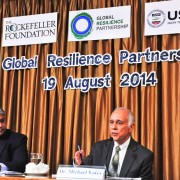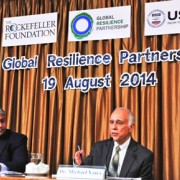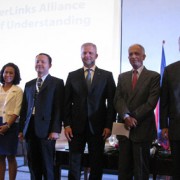
As we know recurrent crises affect countries around the world, and last year alone killed more than 20,000 people. Today we are focusing on Asia, and I will briefly provide some relevant data points to help set the stage for our discussion. First, in Bangladesh, rising sea levels threaten to drown one-fifth of the country’s landmass, where 18 million people now reside. In Nepal, over 2 million live on potentially hazardous fault lines, where earthquakes could cause severe damage. According to the World Bank, $1 out of $3 dollars in development funding is lost as a result of recurrent crises, totaling $3.8 trillion over the last 30 years.

The U.S. Agency for International Development (USAID) and the Rockefeller Foundation have announced a $100 million Global Resilience Partnership that lays out a bold new vision for building resilience to disasters, food insecurity, the effects of climate change and other factors contributing to poverty in communities across Asia and Africa.

A new agreement signed this week at a gathering of public and private sector water experts will make it easier to expand partnerships for better water and wastewater management, benefiting tens of thousands of citizens in cities throughout Asia and the Pacific. Signed at the WaterLinks Forum by the United States Agency for International Development (USAID), WaterLinks, and the WaterLinks Alliance, including Miya Philippines, Inc. (Miya), Borouge Pte Ltd (Borouge), and the Indonesia Water Supply Association (PERPAMSI), the memorandum of understanding (MOU) sets out conditions to help improve urban water supply and sanitation services of at least 220,000 people in the region.
While important progress has been made in recent years, being lesbian, gay, bisexual and transgender (LGBT) in China remains difficult. The first national report on LGBT issues in China commends positive steps such as the abolishment of laws used to intimidate LGBT people and the fact that homosexuality has been taken off the list of mental diseases. The report also highlights a positive growth in LGBT civil society, changing societal attitudes and a growing interest from academic institutions on LGBT-related research and policy discussions.







Comment
Make a general inquiry or suggest an improvement.